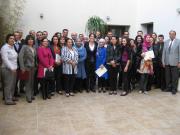

Abonnez-vous aux SCP News
H2020 introduces the Green Banking Concept in Tunisia

The last sessions were dedicated to discuss about the actual financial mechanisms in Tunisia and to think about the drivers for the development of Green Banking and role of the different actors (banks, financial institutions, government, academia, NGOs….).
Around 40 participants from the public sector, the banking sector and consultancies attended to the training course. They showed a high interest for the thematic and expressed their wish to explore more deeply the question, especially concerning the different mechanisms to finance green projects.
The UNEP Green Economy report mentioned that in order to go towards a Green Economy, it is necessary to invest 2% of the Global GDP by 2050 in 10 key economic sectors in order to boost the transition towards a low carbon and sustainable economy.
The banking sector will thus have an essential role in the process of construction of a green economy. To offer products and appropriate services, it will have to adopt a governance including the principles of the sustainable development, to adopt new criteria in its financing and investments. The stakes are important (among others reputation and long-term profitability). To do it, it will also be necessary to define a normative framework adapted to encourage and facilitate this transition.
The main challenges for the banking sector can be structured according to the following 4 axes:
- Global environmental strategy of the bank.
- Reduction of the indirect environmental risks.
- Banking products to individuals, companies and communities taking care of the environment.
- Direct environmental impacts of the bank
All the training materiel can be downloaded using the following link:
Press articles:
http://www.lapresse.tn/25042012/48832/les-banquiers-pensent-finance-verte.html
http://www.econostrum.info/Tunisie-Les-banquiers-tunisiens-s-initient-au-concept-de-la-finance-verte_a10027.html
http://www.maghrebemergent.info/actualite/fil-maghreb/11442-tunisie-les-banquiers-tunisiens-sinitient-au-concept-de-la-finance-verte.html















